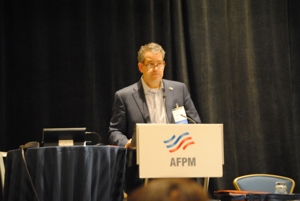Refiners say fuel prices could increase and production plummet if rail strike proceeds
American Fuel & Petrochemical Manufacturers (AFPM) President and CEO Chet Thompson today sent a letter to Congressional leadership—Speaker Nancy Pelosi, Senate Majority Leader Chuck Schumer, Senate Minority Leader Mitch McConnell and House Minority Leader Kevin McCarthy—urging their intervention to avoid a rail worker strike that could begin as soon as this Friday, September 16. Upon sending the letter, Chet Thomson issued the following statement stressing the importance of rail transit to the refining and petrochemical industries and the need for broader rail reform. A copy of AFPM’s letter is available here.
"Congress needs to intervene to avoid a labor lockout or strike. Uncompetitive rail shipping fees and poor service are already costing refiners, petrochemical manufacturers and U.S. consumers. A stoppage of service would make things worse, freezing critical deliveries and pickups from our sites and potentially forcing some facilities to cut production. AFPM will help in whatever ways we can to bring about reconciliation so we can all get back to the work of pursuing bipartisan STB reauthorization and long overdue rail service reforms.”
The refining and petrochemical industries will be heavily exposed in the event of a rail labor strike, and railroads are already embargoing shipments of critical materials ahead of a potential strike. While refiners and petrochemical manufacturers have contingency plans, a shutdown in rail service would result in widespread production curtailments and some potential facility shutdowns as early as this weekend, possibly leaving some sensitive regional markets with insufficient fuel.
- More than 2 MM carloads of fuel and petrochemical feedstocks and products move by rail every year.
- Roughly 300,000 barrels of crude oil move by rail each day, volume that could supply about two mid-size refineries. Other critical feedstocks, chemicals and additives—such as Isobutane for gasoline production and water treatment chemicals like chlorine—are delivered daily by rail. Some regions, because of limited pipeline capacity and inadequate trucking alternatives, have no option apart from rail to receive these essential deliveries.
- Five million barrels of propane—roughly a third of U.S. consumption—move by rail each month.
- Refineries need consistent rail service to maintain operations. If rail cars aren’t coming in regularly to pick up facility products, including the sulfur that refiners remove from crude oil, production will have to curtail. If sulfur cannot be moved out, for example, crude refining cannot continue at the same pace.
- Nearly all finished gasoline in the United States is 10 percent ethanol (E10) and much of the ethanol required for fuel is transported from the midcontinent via rail. Rail service for the ethanol industry is already known to be problematic and a cause of production cuts at some facilities. A strike would make this tenuous situation even worse.







Comments